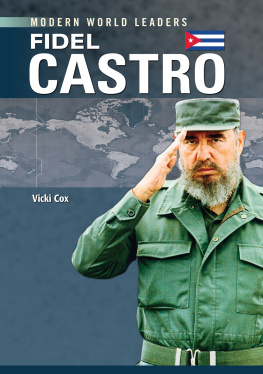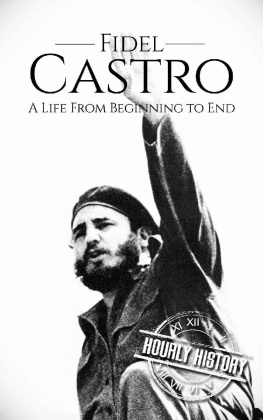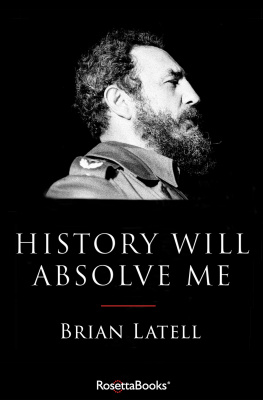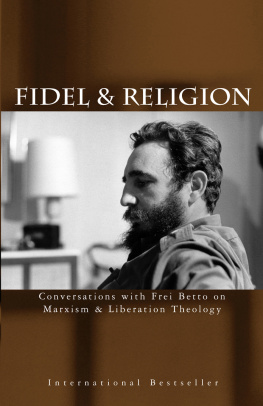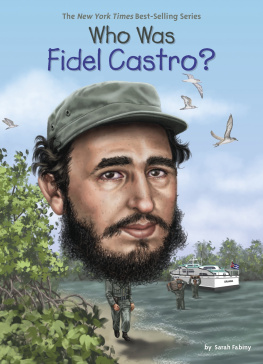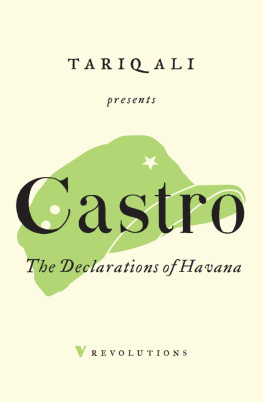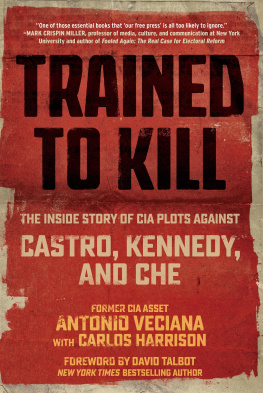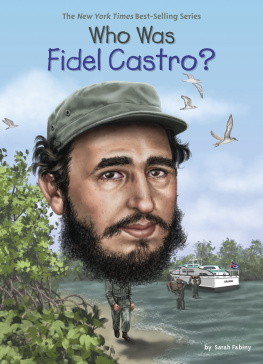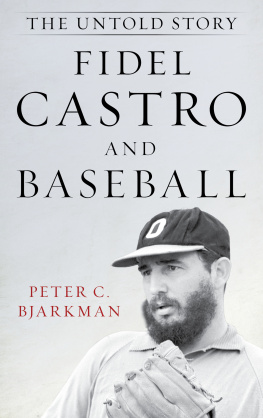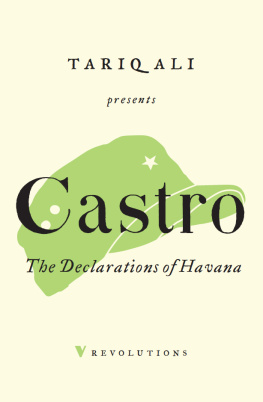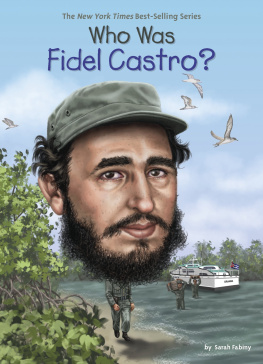Vicki Cox - Fidel Castro
Here you can read online Vicki Cox - Fidel Castro full text of the book (entire story) in english for free. Download pdf and epub, get meaning, cover and reviews about this ebook. year: 2013, publisher: Infobase Publishing, genre: Politics. Description of the work, (preface) as well as reviews are available. Best literature library LitArk.com created for fans of good reading and offers a wide selection of genres:
Romance novel
Science fiction
Adventure
Detective
Science
History
Home and family
Prose
Art
Politics
Computer
Non-fiction
Religion
Business
Children
Humor
Choose a favorite category and find really read worthwhile books. Enjoy immersion in the world of imagination, feel the emotions of the characters or learn something new for yourself, make an fascinating discovery.
Fidel Castro: summary, description and annotation
We offer to read an annotation, description, summary or preface (depends on what the author of the book "Fidel Castro" wrote himself). If you haven't found the necessary information about the book — write in the comments, we will try to find it.
Fidel Castro may be the most underestimated leader of the 20th century. This biography tells the intriguing story of Castro and the country he led, from his childhood to his revolution to the year he stepped down, and details his long and eventful tenu
Fidel Castro — read online for free the complete book (whole text) full work
Below is the text of the book, divided by pages. System saving the place of the last page read, allows you to conveniently read the book "Fidel Castro" online for free, without having to search again every time where you left off. Put a bookmark, and you can go to the page where you finished reading at any time.
Font size:
Interval:
Bookmark:
Copyright 2013 by Infobase Learning
All rights reserved. No part of this publication may be reproduced or utilized in any form or by any means, electronic or mechanical, including photocopying, recording, or by any information storage or retrieval systems, without permission in writing from the publisher. For more information, contact:
Chelsea House
An imprint of Infobase Learning
132 West 31st Street
New York NY 10001
ISBN 978-1-4381-4751-2
You can find Chelsea House on the World Wide Web
at http://www.infobaselearning.com
Fidel Castro's army, all of 82 men, scattered in every direction. Some of his men were dead or bleeding in a Cuban sugarcane field. Some were cowering in the woods. Fragmentation bombs exploded around them. Armed soldiers roamed the area, searching for Castro and his men. Government aircraft flew above them. Hidden in a sugarcane field, covered with straw, Castro whispered to the two men beside him, "We are winning. Victory will be ours."
Only Castro could look into complete defeat and still think he had triumphed. Though his guerrilla uniform was caked with mud, his face cut, and his beard dirty, Castro believed he was fulfilling his destiny and Cuba's. Being ambushed made no difference at all. He would overthrow dictator Fulgencio Batista's government. He would go right through its Rural Guard, national police, Sherman tanks, artillery, U.S.-supplied aircraft, and army of 40,000 soldiers. Castro believed he could conquer his opposition with a vision and hope that his fellow countrymen would join him in ending the cruelty and brutality of their president-turned-dictator.
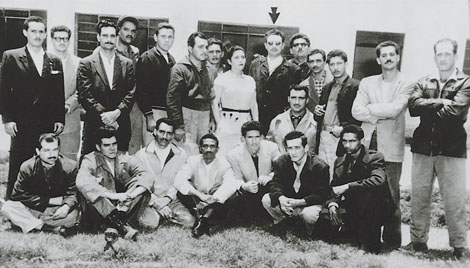
Fidel Castro (under the arrow) and 20 other Cuban exiles pose in front of a government office in Mexico City in June 1956. Five months later, Castro and a small rebel force set sail from Mexico for Cubain a trouble-plagued invasion.
Source: AP/Wide World Photos.
Sixteen years before, in 1940, Batista had been elected the president of Cuba. Almost from the start, his government was corrupt. His police officers took kickbacks and were involved with prostitution, gambling, and drug rings. All commercial establishments paid contributions to the local precincts. When his four-year term ended, Batista left Cuba for Florida, watching while two other presidents, Ramon Grau San Martin and Carlos Prio Socarras, shredded the country even more. Batista wanted to run Cuba once again. Knowing he would not win office in free elections, he orchestrated a military coup that overthrew Prio, the outgoing president.
Once he seized the presidency in 1952, Batista censored newspapers, television, and radio. He banned elections and placed restrictions on opposition parties. Torture and imprisonment without a trial were common. The political parties had no strong leader to stand up to him and no plan to oppose him. The only real opposition to the Batista regime came in the university students' noisy, but short, demonstrations. Having exhausted all legal means to rid Cuba of its U.S.-backed dictator, Castro and a handful of Cubans realized that the only possible way to free Cuba from Batista was by armed revolution.
Castro had been moving toward his insurrection for four years, ever since Batista returned. He gave speeches, wrote articles, and led student demonstrations. He organized secret cells of soldiers. In Mexico, loyal young supporters trained to invade Cuba and overthrow Batista.
To look at the catastrophe in the cane fields and still think he had triumphed, Castro had to be a man with an enormous ego and unshakeable self-confidenceor else he was completely crazy. In fact, Castro had been called "el loco" before.
From its beginning in the fog-shrouded harbor of Tuxpan, Mexico, to the landing on Cuban soil, nothing had gone right in Castro's revolution. Because an informant had told the Mexican police about part of Castro's plan, some of his soldiers were arrested and their weapons were seized. Castro then hurriedly ordered his men to set sail on November 24, 1956. They left so unexpectedly that some of his followers did not know the expedition was really beginning. Once they saw the foul weather ahead of them, some didn't want to leave at all.
Castro's boat, the Granma, was hardly a vehicle worthy of a revolution. The rebels thought the dilapidated yacht, with its 25-person capacity, was a ferry to their real invasion boat. Its engine needed repair, its clutch slipped, and the bilge pump didn't work. Its one lifeboat was riddled with holes. Castro crowded 82 men, along with weapons and ammunition, on board. The boat was so overcrowded that only half the men could sit down; the other half stood. Water nearly lapped over the side.
Castro's forces were sailing to a destination 1,235 miles (1,988 kilometers) away. Entering the Gulf of Mexico, the men sang the Cuban national anthem and shouted, "Viva la Revolucin" and "Down with the Batista dictatorship."
Then the northern winds whipped the little boat about violently. For two days, the liberators of the Cuban people forgot about glory and revolution. One participant later wrote that the men were "grabbing their stomachs; some with their heads inside buckets, others fallen in the strangest positions, motionless, their clothes filthy from vomit." Castro and three veteran seamen were the only ones not overcome by the heavy seas. The pump, which should have rid the boat of the crashing water, broke down. The men bailed furiously with buckets to keep afloat.
On November 26, they crept past the Yucatn Peninsula, and the weather improved. For all his vision of liberty and justice, Castro had not calculated on weather delays or on how much an overloaded boat would slow them down. Chugging along at eight miles (13 kilometers) per hour, the planned five-day-and-night trip stretched into seven. The men ran out of food, and before they landed, they would go two days without food or water.
More critical for Castro's revolution, the Granma was behind schedule by two days and 180 miles (290 kilometers). The revolutionaries should have arrived on November 30, at the same time that Frank Pais, a leader of the urban arm of Castro's so-called 26th of July Movement, attacked the city of Santiago. With 28 men, Pais attacked the customshouse, the police headquarters, and the harbor building to draw military units into the city and away from Castro's landing site. All the assault accomplished, however, were the deaths or capture of the rebels and an alert to the government about Castro's arrival.
On the Granma, mishaps continued as the boat neared Cuba. Searching for land, the boat's navigator, one of only three professional sailors manning the boat, fell overboard. Several hours were spent searching the seas for him. The delay cost Castro the last bit of cover that darkness would have provided the landing.
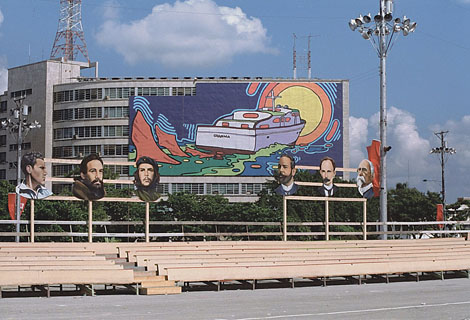
A billboard at the plaza Mart in Havana shows the yacht Granma, on which Fidel Castro and 81 rebels returned to Cuba in late 1956. The dilapidated yacht was so overcrowded that only half the men could sit down.
Source: Charles Tasnadi/AP/Wide World Photos.
When Castro reached Cuba on December 2, the mission did not get any easier. The landing was literally a shipwreck. The Granma ran aground 100 yards (91 meters) off shore. Instead of departing like soldiers after pulling up to a pier, the men jumped into the water, carrying only personal items and small weapons. The heavy weapons, supplies, and the radio transmitter were stranded on the boat. The rebels also ended up a mile off target. Fifty local rebels were waiting at the appointed beach with jeeps and trucks to transport the equipment and Castro's men into the Sierra Maestra mountains. When Castro didn't appear, they left.
Font size:
Interval:
Bookmark:
Similar books «Fidel Castro»
Look at similar books to Fidel Castro. We have selected literature similar in name and meaning in the hope of providing readers with more options to find new, interesting, not yet read works.
Discussion, reviews of the book Fidel Castro and just readers' own opinions. Leave your comments, write what you think about the work, its meaning or the main characters. Specify what exactly you liked and what you didn't like, and why you think so.

